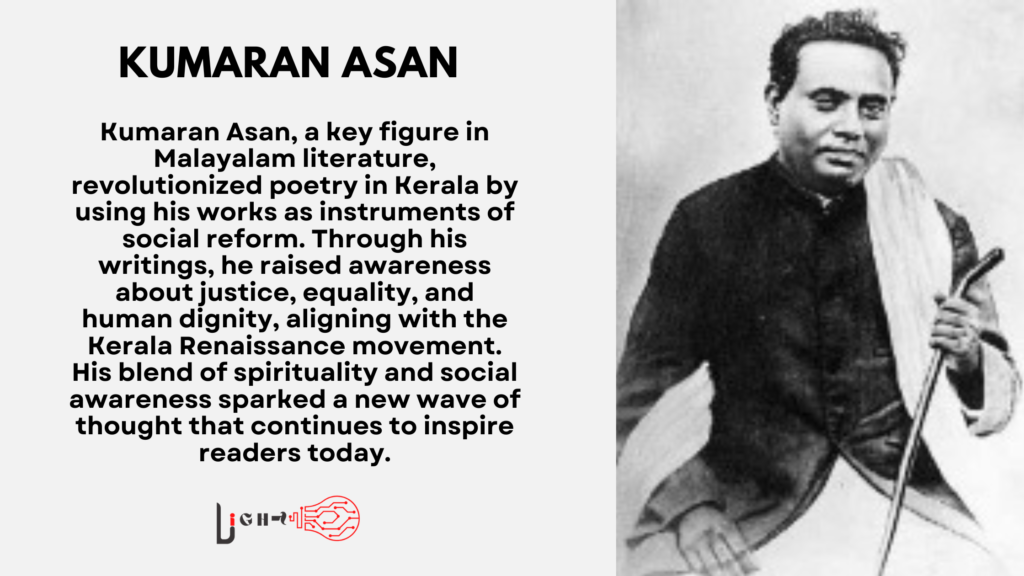Kumaran Asan, one of the towering figures of Malayalam literature, forever changed the way poetry was perceived and written in Kerala. His works were not just poems; they were tools of social reform, awakening the masses to issues of justice, equality, and human dignity. His voice became a beacon for change, echoing the ideas of the Kerala Renaissance movement. With his unique blend of spirituality and social consciousness, Asan’s writings created a new wave of thought that continues to inspire readers today.
Early Life and Influences of Kumaran Asan
Kumaran Asan was born in 1873 in Kayikkara, a small village in Kerala, to a family of modest means. Early on, he was exposed to the rich cultural heritage of Kerala, especially its classical poetry and traditional art forms. His education was heavily influenced by his mentor, Sree Narayana Guru, a social reformer who inspired Asan’s vision of a society free from caste discrimination and inequality.
Asan’s time in Sri Lanka, where he studied Sanskrit and philosophy, also left a lasting impact on his literary outlook. He became deeply interested in Buddhism, which is evident in the spiritual depth of his poetry. Asan’s early exposure to social reform and his education in classical languages and philosophy laid the foundation for his revolutionary work in Malayalam literature.
Major Themes in Kumaran Asan’s Work
Kumaran Asan’s poetry often revolved around themes of social justice, love, and spirituality. He was not afraid to challenge the deeply ingrained caste system of his time, using his writings to advocate for a more just and equitable society. His works also explored human emotions and the transient nature of life, always with a deeply philosophical undertone.
Social Reform and Justice
One of the defining aspects of Asan’s work was his unwavering commitment to social justice. He was a key figure in the fight against caste-based oppression and believed in the power of literature to inspire change. In his poetry, Asan often depicted the struggles of the oppressed, calling for a society where individuals are judged by their deeds, not their birth. His poems became a voice for the marginalized, resonating with people who longed for a more just world.
Love, Spirituality, and Humanism
Apart from social reform, Kumaran Asan’s poetry also delved into themes of love, spirituality, and humanism. His spiritual beliefs, shaped by Buddhism and the teachings of Sree Narayana Guru, often permeated his verses. Asan portrayed love as a sacred bond that transcends the physical, focusing instead on its spiritual and emotional dimensions. His writings reflected the fleeting nature of life, urging readers to seek inner peace and understanding.
The Sun: The Star That Powers Life on Earth
To know more click here:https://light.vintbit.com/general-knowledge/sun-heart-of-solar-system-life/
Kumaran Asan’s Most Influential Works
Kumaran Asan’s contribution to Malayalam literature is vast, but certain works stand out for their profound impact. Each of these works introduced fresh perspectives and gave voice to ideas that were revolutionary for their time.
Veenapoovu (The Fallen Flower)
Veenapoovu is perhaps Asan’s most famous work, symbolizing the fragility of life and the inevitable decline that all beings face. The poem is a reflection on the nature of existence, using the metaphor of a flower that has fallen to the ground to symbolize the impermanence of life. Through simple yet poignant language, Asan invites readers to ponder life’s fleeting nature and the universal truth of death. It remains a beloved piece in Malayalam literature for its philosophical depth and artistic beauty.
Chinthavishtayaaya Sita (Sita Lost in Thought)
Another significant work, Chinthavishtayaaya Sita, reimagines the iconic figure of Sita from the Indian epic, Ramayana. In this poem, Asan presents Sita as a woman deeply contemplative about her role in society and her personal sacrifices. Through this work, Asan not only brings a new perspective to a traditional character but also questions the patriarchal norms that confine women to rigid roles. It’s a powerful critique of societal expectations and remains relevant even today
Asan’s Legacy in Malayalam Literature
Kumaran Asan’s legacy in Malayalam literature is unparalleled. He brought a modern sensibility to traditional poetry, blending classical forms with contemporary themes of social justice and humanism. His works have inspired countless poets and writers in Kerala and beyond, leaving a lasting impression on Indian literature as a whole.
Asan’s influence extended beyond literature; he played an integral role in Kerala’s cultural renaissance. His poetry spoke to the struggles and aspirations of the common people, making him a beloved figure across social classes. Today, Kumaran Asan is remembered not only as a poet but as a thinker whose words helped reshape Malayalam literature and the social fabric of Kerala.1
Conclusion
Kumaran Asan’s words were more than just poetic expressions; they were instruments of change. His ability to blend themes of love, justice, and spirituality made his works timeless. The social relevance of his writing continues to resonate with modern readers, as the values he promoted are still integral to contemporary discussions around equality and human rights. Asan’s revolution of Malayalam literature through his words has left an indelible mark on history, ensuring that his legacy will endure for generations to come.

